Football is more than just a game—it is a legacy, a global culture, and an emotional bond for billions of fans. Across history, certain players have transcended the sport through their skill, charisma, leadership, and achievements. In this article, we present the top 10 most iconic and popular football players of all time, along with detailed insights into their careers, trophies, personal lives, and enduring impact.
1. Pelé (Brazil)
Full Name: Edson Arantes do Nascimento
Date of Birth: October 23, 1940
Died: December 29, 2022
Position: Forward
National Team: Brazil (1957–1971)
Clubs: Santos FC (1956–1974), New York Cosmos (1975–1977)
Family: Father of Edinho (former goalkeeper), married three times, several children
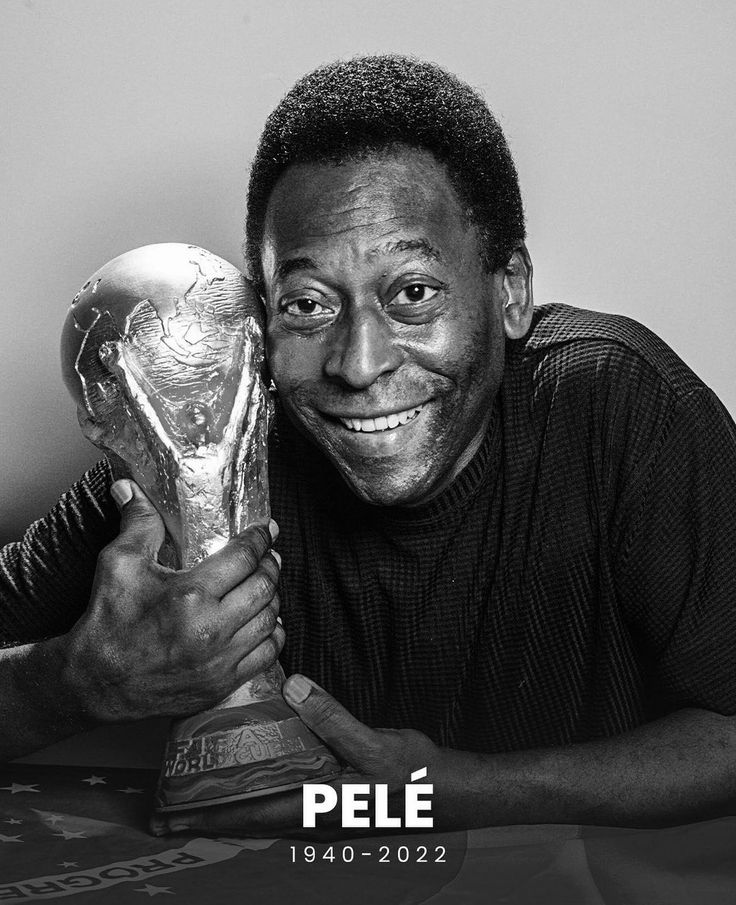
Career Highlights & Trophies:
- FIFA World Cup: 1958, 1962, 1970
- Copa Libertadores: 1962, 1963 (with Santos)
- Intercontinental Cup: 1962, 1963
- Brazilian Championship: 1961, 1962, 1963, 1964, 1965, 1968
- New York Cosmos: NASL Championship 1977
Total Goals: 1,281 goals in 1,363 matches (including friendlies)
Influence: Often called “The King of Football,” Pelé was named FIFA Player of the Century in 2000 (alongside Maradona). After retirement, he served as Brazil’s Sports Minister and a UNICEF ambassador.
Lifestyle: Humble and philanthropic, Pelé invested time in education and child welfare projects in Brazil.
Pelé‘s Story
In the small town of Três Corações, Brazil, on October 23, 1940, a boy was born who would one day be called the King of Football. His name was Edson Arantes do Nascimento — but the world would come to know him simply as Pelé.
Pelé’s early days were shaped by struggle and simplicity. Born into poverty, his family lived a modest life. His father, Dondinho, was a footballer whose career was cut short by injury, and his mother, Celeste, worked tirelessly to keep the family going. Money was scarce, but love and dreams were abundant.
As a child, Pelé could not afford a real football. So he crafted his own, stuffing socks with paper or using a grapefruit — anything that could roll became the ball he chased through dusty streets. He played barefoot with neighborhood kids, turning every alley into a stadium. Even then, his skill was undeniable. He moved with a joy and instinct that made others stop and watch.
At just ten years old, he vowed to one day win a World Cup for Brazil after seeing his father cry when Brazil lost in the 1950 final. That promise became his fire.
He joined a youth club, where a former Brazilian star, Waldemar de Brito, saw the spark in his eyes and brought him to Santos FC. At the age of fifteen, Pelé made his debut for the senior team. At sixteen, he wore the yellow jersey of Brazil. And at seventeen — still barely a boy — he lit up the world in Sweden, winning the 1958 World Cup with dazzling brilliance. He fulfilled his promise, and Brazil wept tears of joy this time.
But the journey began long before the glory. It began with a barefoot boy, a sock-ball, and an unshakable dream. Pelé never forgot those humble roots, and neither will the world. His childhood was not just a beginning — it was the heartbeat of a legend.
2. Diego Maradona (Argentina)
Full Name: Diego Armando Maradona
Date of Birth: October 30, 1960
Died: November 25, 2020
Position: Attacking Midfielder
National Team: Argentina (1977–1994)
Clubs: Argentinos Juniors, Boca Juniors, Barcelona, Napoli, Sevilla, Newell’s Old Boys
Family: Married Claudia Villafañe, five children
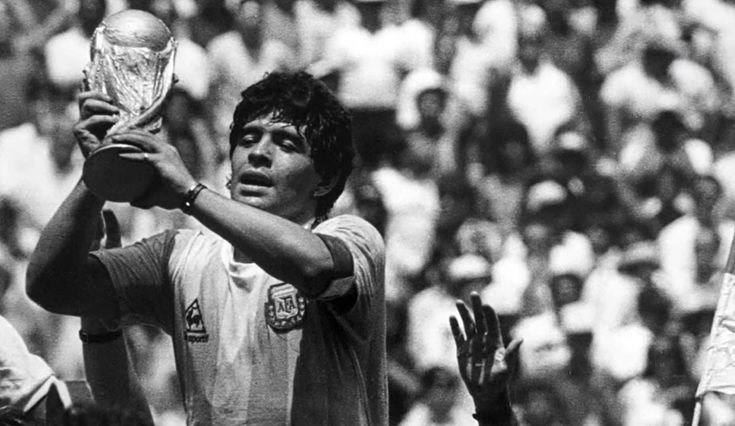
Career Highlights & Trophies:
- FIFA World Cup Winner: 1986
- Serie A (Italy): 1986–87, 1989–90 (with Napoli)
- Coppa Italia: 1986–87
- UEFA Cup: 1988–89
- Argentine Primera División: 1981 (Boca Juniors)
Legacy: Known for the “Hand of God” and “Goal of the Century” in 1986, Maradona is remembered for his artistry and rebellious genius.
Lifestyle: Maradona lived a tumultuous life involving addiction, legal issues, and health problems. Still, he was adored in Argentina and Naples until his death.
Diego Maradona‘s Story
One of the most cherished memories from his childhood was the day he received his very first real football. It was a gift from his uncle Cirilo on his third birthday. Unlike the plastic balls or bundles of rags he was used to playing with, this was a genuine leather ball. Diego was so overjoyed that he slept with it in his bed every night. For him, it wasn’t just a toy — it was a treasure, a symbol of hope, and the beginning of a lifelong love story.
On the dusty streets of Villa Fiorito, Diego played barefoot for hours, mesmerizing older kids with his unmatched dribbling skills. He would juggle oranges, tennis balls, even stones — anything he could find. People would gather to watch the boy with magic in his feet. At only eight years old, he could juggle a football over a hundred times without letting it drop — a moment that stunned his entire neighborhood and hinted at the greatness to come.
At the age of nine, Maradona joined a youth team called Los Cebollitas (The Little Onions). The team went on to win 136 consecutive matches, with Diego as their shining star. His talent was so incredible that scouts questioned his age, unable to believe a child so young could play with such maturity. “I’m 8, sir,” he once replied proudly, “and I’m just getting started.”
Behind every step of his journey was the quiet strength of his mother, Doña Tota. In many interviews, Maradona would recall how she pretended to be full at dinner so her children could eat. “She would say she already ate,” he remembered, “when she hadn’t had a bite.” That sacrifice fueled his determination to succeed — not just for himself, but for the family that had given him everything.
Though he would one day become a global football icon, Maradona never forgot his roots. He often spoke of that small leather ball, the dusty fields, and the love of his family. In his own words: “Everything I am, I owe to that little boy who played barefoot in Villa Fiorito.”
3. Lionel Messi (Argentina)
Full Name: Lionel Andrés Messi
Born: June 24, 1987
Position: Forward
National Team: Argentina (2005–Present)
Clubs: Barcelona (2004–2021), PSG (2021–2023), Inter Miami (2023–Present)
Family: Married to Antonela Roccuzzo, three sons
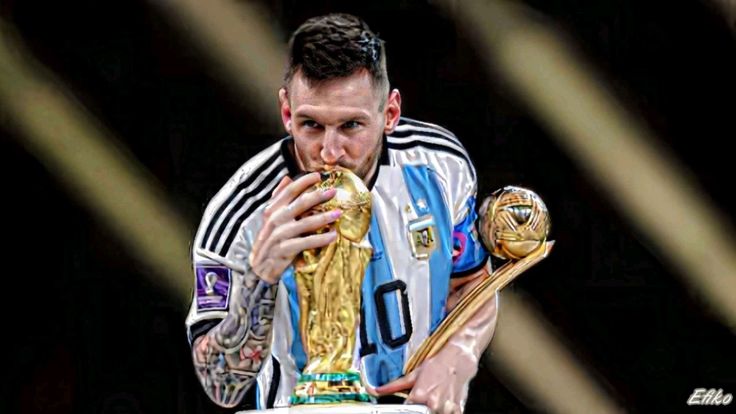
Career Highlights & Trophies:
- FIFA World Cup: 2022
- Copa America: 2021
- Olympic Gold Medal: 2008
- FIFA U-20 World Cup: 2005
- Ballon d’Or: 8 times (2009, 2010, 2011, 2012, 2015, 2019, 2021, 2023)
- Champions League: 2006, 2009, 2011, 2015
- La Liga: 10 times
- Club World Cup: 2009, 2011, 2015
Lifestyle: Messi is a low-profile family man with charitable interests and owns the “MiM Hotels” chain in Spain.
Lionel Messi’s Story
In the city of Rosario, Argentina, on June 24, 1987, a boy was born with a gift so rare, it would one day mesmerize the entire world. His name was Lionel Andrés Messi — known today simply as Messi, the magician of football.
Messi grew up in a tight-knit, working-class family. His father, Jorge, worked in a steel factory, and his mother, Celia, was a cleaner. Life was not luxurious, but it was filled with love and laughter. From the earliest days, Messi was drawn to the ball — always with it, sleeping beside it, playing until the sun went down.
But fate tested him early. At the age of 10, Messi was diagnosed with a growth hormone deficiency. He was unusually small for his age, and the costly treatment his body needed was beyond his family’s means. His future in football — and in health — stood on a knife’s edge.
Still, Messi never stopped playing. Despite his small frame, he glided past defenders with lightning speed and incredible control. He had a quiet fire — not loud, not boastful — but fierce and unshakable. His talent was too bright to ignore.
When local clubs couldn’t afford his treatment, hope seemed dim. But across the ocean in Spain, FC Barcelona took a chance on the tiny boy from Rosario. On a napkin, they wrote his first contract. They not only offered him a place in their youth academy, La Masia, but also covered the medical treatment that would help him grow.
At 13 years old, Messi left his country, his friends, and much of his family behind, chasing a dream with tears in his eyes and courage in his heart. It was the hardest goodbye, but also the most important beginning.
What followed was a journey of greatness. Messi, the boy once told he was too small, grew into a giant of football — breaking records, winning trophies, and capturing hearts all over the world.
Yet, behind every goal and every roar of the crowd, there still lived the little boy from Rosario — quiet, determined, and full of dreams.
4. Cristiano Ronaldo (Portugal)
Full Name: Cristiano Ronaldo dos Santos Aveiro
Born: February 5, 1985
Position: Forward
National Team: Portugal (2003–Present)
Clubs: Sporting CP, Manchester United, Real Madrid, Juventus, Al Nassr
Family: Partner Georgina Rodríguez, father of five
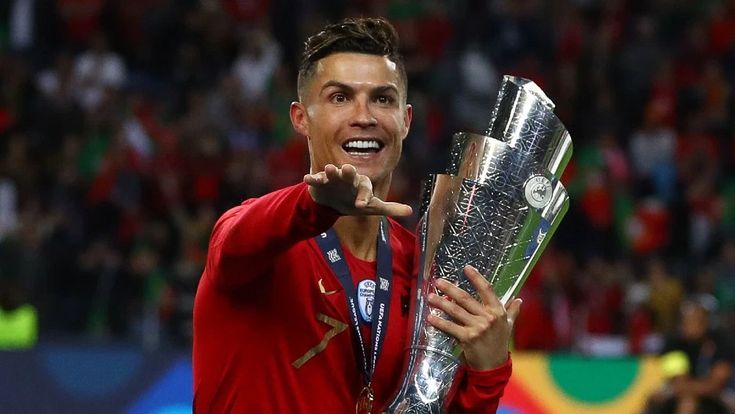
Career Highlights & Trophies:
- European Championship: 2016
- Nations League: 2019
- Champions League: 5 times (2008, 2014, 2016, 2017, 2018)
- Ballon d’Or: 5 times (2008, 2013, 2014, 2016, 2017)
- Premier League: 3 times
- La Liga: 2 times
- Serie A: 2 times
Lifestyle: Known for a strict fitness routine and luxury lifestyle, Ronaldo owns CR7 hotels, a fashion line, and donates to cancer treatment and children’s hospitals.
Cristiano Ronaldo’s story
On February 5, 1985, in the small island town of Funchal, Madeira, Portugal, a boy was born who would go on to redefine ambition, discipline, and greatness. His name: Cristiano Ronaldo dos Santos Aveiro — today simply known as Ronaldo, a legend etched in time.
Cristiano’s childhood was far from glamorous. He was the youngest of four children in a poor family. His father, José Dinis Aveiro, worked as a gardener and kit man at a local football club, and his mother, Maria Dolores, worked as a cook and cleaning lady. They struggled financially, living in a small tin-roofed home where luxury was a distant dream. But they had each other — and Cristiano had a dream.
From the age of three, Ronaldo was inseparable from the ball. He played on the streets, in alleys, and on rough fields, dribbling past trees and rocks as if they were defenders. His speed, his drive, his hunger — even then — were unmatched. He trained harder than any boy around him, often crying when he lost, furious when he didn’t perform well.
At just 11 years old, Ronaldo left home to join the prestigious Sporting CP academy in Lisbon — hundreds of kilometers away from his family. It was a tough chapter. He was homesick, teased for his accent, and sometimes went to bed crying. But even as a boy, Ronaldo had the heart of a fighter.
When doctors diagnosed him with a racing heart condition — a threat to his football career — many feared the end. But Cristiano underwent surgery and returned to the field with more fire than ever. He told himself he would become the best in the world — and he meant it.
Every morning, while others slept, he trained. While others rested, he improved. His obsession with greatness wasn’t luck — it was forged in hardship, in sweat, and in countless lonely nights.
That little boy from Madeira, once mocked and doubted, became a global icon. He lifted trophies, shattered records, and inspired millions. But he never forgot the dirt roads, the hungry days, or the silent promises he made as a child.
Cristiano Ronaldo’s story is not just about talent. It is about refusing to give up. About turning pain into power. And most of all, it’s about a boy who believed he was meant for more — and never stopped until the world believed it too.
5. Zinedine Zidane (France)
Full Name: Zinedine Yazid Zidane
Born: June 23, 1972
Position: Midfielder
National Team: France (1994–2006)
Clubs: Cannes, Bordeaux, Juventus, Real Madrid
Family: Married to Véronique Zidane, four sons (all footballers)
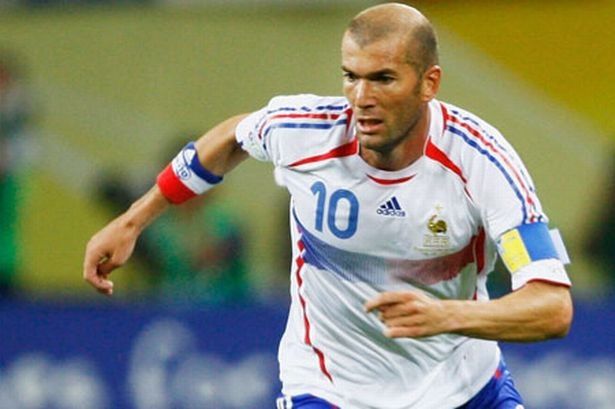
Career Highlights & Trophies:
- FIFA World Cup: 1998
- UEFA Euro: 2000
- Champions League (as player): 2002
- Champions League (as coach): 2016, 2017, 2018
- Ballon d’Or: 1998
- Serie A: 1996–97, 1997–98
Lifestyle: Respected for humility and leadership. He remains active in football and philanthropy.Zidane vs. Luis Enrique – 2003
Before the infamous World Cup moment, Zidane had a bit of a heated confrontation with Luis Enrique, a Spanish player, during a Real Madrid vs. Barcelona match in 2003. Zidane and Enrique had been involved in a physical battle throughout the game, and things took a turn when Enrique fouled Zidane.
Enrique, frustrated by Zidane’s skill and the fact that he was not allowing him to gain control of the match, made a rough challenge on Zidane. Zidane, who had been the subject of numerous fouls throughout the game, couldn’t hold back and retaliated by pushing Enrique. This led to both players squaring off in front of the referee, with some shouting and minor pushing involved. Zidane was given a yellow card for the incident, but it didn’t escalate any further.
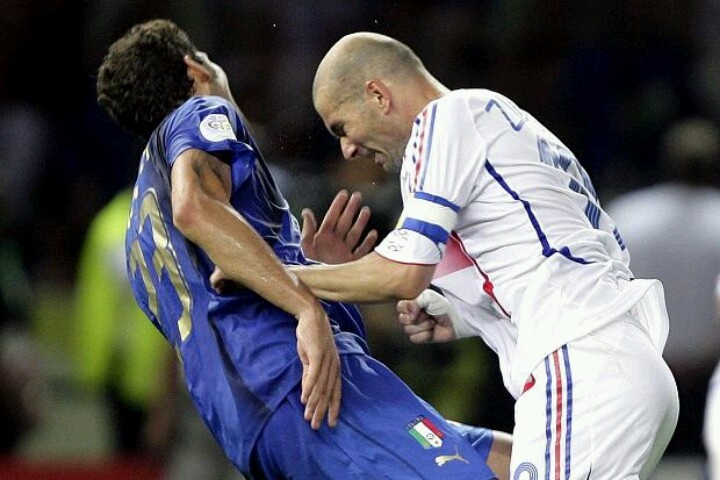
Despite the heated nature of the confrontation, Zidane managed to maintain his composure and finished the game without any more incidents. This moment was one of the rare times in Zidane’s career when he allowed his emotions to show in a confrontational situation.
Zinedine Zidane’s story
In the heart of La Castellane, a rough neighborhood in Marseille, France, a boy was born on June 23, 1972, to Algerian immigrant parents. His name: Zinedine Yazid Zidane — a name that would one day echo in the halls of football greatness.
Zidane grew up the youngest of five children, in a family that had fled poverty and war in Algeria to seek a better life in France. Life in La Castellane was tough — the streets were crowded, tension ran high, and opportunities were few. But amid all that struggle, Zidane found beauty in a ball.
He learned football on the concrete pitches and dusty streets of the neighborhood, where the game was raw and intense. There were no coaches, no soft grass, no fancy gear — just instinct, rhythm, and survival. Zidane played barefoot, using walls, lamp posts, and fences as teammates and opponents. The streets shaped his style — elegant, calm, unpredictable. A dancer in chaos.
Even as a child, Zidane had a quiet presence. He spoke little, but his feet did all the talking. His balance, vision, and control made people stop and watch. He wasn’t flashy; he was fluid, like poetry in motion.
At 14 years old, he left home to join the Cannes youth academy, moving hundreds of miles away. The journey wasn’t easy — he faced racism, isolation, and homesickness. But Zidane endured. He trained relentlessly and earned respect not through words, but through pure, graceful play.
He rose through the ranks with determination, driven by his love for the game and a deep sense of pride in his heritage. Though he faced prejudice for his Algerian roots, he carried them with honor — never forgetting where he came from.
Years later, Zizou would lead France to its first World Cup title in 1998, becoming a national hero. But even then, he stayed humble — always remembering the boy from La Castellane who juggled dreams between broken pavements and city noise.
Zidane’s childhood was not golden, but it was real. It built the man who played with his head held high, feet full of magic, and a heart rooted in family, struggle, and pride.
6. Ronaldinho (Brazil)
Full Name: Ronaldo de Assis Moreira
Born: March 21, 1980
Position: Attacking Midfielder
National Team: Brazil (1999–2013)
Clubs: Gremio, PSG, Barcelona, AC Milan, Flamengo, Atletico Mineiro
Family: Close to brother Roberto, also his agent
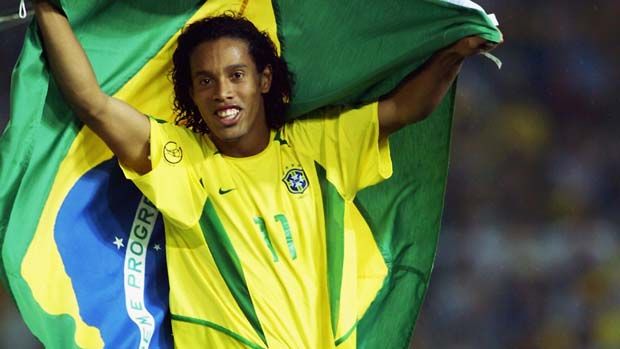
Career Highlights & Trophies:
- FIFA World Cup: 2002
- Ballon d’Or: 2005
- La Liga: 2004–05, 2005–06
- Champions League: 2005–06
- Copa Libertadores: 2013 (Atletico Mineiro)
Lifestyle: Known for charisma and flair. Faced legal issues but remains a beloved icon and ambassador.
Ronaldinho’s Story
In the vibrant city of Porto Alegre, Brazil, on March 21, 1980, a boy was born with a smile on his face and magic in his feet. His name: Ronaldo de Assis Moreira — but to the world, he became simply Ronaldinho, the joyful artist of football.
Ronaldinho grew up in a poor but football-loving family. His father, João, worked at a shipyard and was also a part-time footballer, while his mother, Dona Miguelina, worked as a nurse. Football was in the family’s blood — his older brother, Roberto, was a rising star too. But tragedy struck early.
When Ronaldinho was just 8 years old, his father died of a heart attack in their swimming pool. The loss left a deep scar. But even in grief, Ronaldinho found light — in the game his father loved so much.
He started playing in the streets, beaches, and futsal courts of Porto Alegre. He played with bare feet and wide eyes, copying tricks, inventing moves, and always — always — smiling. He danced with the ball like it was part of him. He didn’t just play football; he performed it, like music.
At 13, he scored 23 goals in a single youth match — a local legend was born. By 17, he made his professional debut for Grêmio, and Brazil soon had a new samba king.
What made Ronaldinho different wasn’t just his insane skill or wild dribbles — it was joy. He played like a kid, even on the biggest stages. Whether at the World Cup, Barcelona, or AC Milan, he brought laughter, art, and a reminder: football is a game — and games are meant to be fun.
But behind that fun was a tough childhood, shaped by loss, love, and family. Ronaldinho never forgot his roots. He honored his father with every touch, every trick, and every goal that made millions cheer.
Ronaldinho’s story is a celebration — of resilience, creativity, and the power of joy. He was the boy who brought the streets to the stadium and reminded the world why we fell in love with the game.
7. David Beckham (England)
Full Name: David Robert Joseph Beckham
Born: May 2, 1975
Position: Midfielder
National Team: England (1996–2009)
Clubs: Manchester United, Real Madrid, LA Galaxy, Milan, PSG
Family: Married Victoria Beckham, four children
Career Highlights & Trophies:

- Premier League: 6 times
- FA Cup: 2 times
- Champions League: 1998–99
- La Liga: 2006–07
- MLS Cup: 2011, 2012
Lifestyle: Business mogul, co-owner of Inter Miami CF, and fashion icon. Engaged in numerous philanthropic causes.
David Beckham’s Story
In the heart of Leytonstone, East London, on May 2, 1975, a boy was born with a dream stitched into every breath he took. His name: David Robert Joseph Beckham — a boy who would one day bend the game to his will, and become a global icon.
David’s childhood was grounded in modesty and passion. His father, Ted, was a kitchen fitter, and his mother, Sandra, a hairdresser. Life was simple but filled with love, especially for one thing: football. The Beckhams were die-hard Manchester United fans — and little David inherited that devotion like a birthright.
From the time he could walk, Beckham had a ball at his feet. While other kids played video games or rode bikes, David was out in the yard or at the park, practicing free kicks. He would kick the ball again and again against a wall, perfecting his technique for hours. His dream was clear — to play for Manchester United.
He faced setbacks too. At school, some teachers laughed when he said he wanted to be a footballer. “You should choose something realistic,” they told him. But Beckham didn’t listen. He had a silent determination — not loud or brash — but deeply focused.
At just 11 years old, he won the coveted Bobby Charlton Soccer School national skills competition, catching the attention of scouts. That same year, he was invited to train with Barcelona’s youth team, but his heart was set on England.
His hard work paid off when he joined Manchester United’s Youth Academy at 16. He moved away from home to live at the club’s training residence — washing his own clothes, doing chores, and learning the discipline that would shape him into a professional.
And from those early morning practices to lonely nights away from family, David Beckham became not just a footballer — but a symbol of class, passion, and precision. He wore the number 7 jersey with pride, scoring stunning free kicks that curved like poetry and inspired a generation.
But behind the fame, the fortune, and the flashbulbs, he never forgot the boy from East London — the boy who bent it every day, chasing a dream with both feet on the ground and stars in his eyes.
8. Johan Cruyff (Netherlands)
Full Name: Hendrik Johannes Cruijff
Born: April 25, 1947
Died: March 24, 2016
Position: Forward/Midfielder
National Team: Netherlands
Clubs: Ajax, Barcelona, Feyenoord
Family: Son Jordi Cruyff is also a footballer
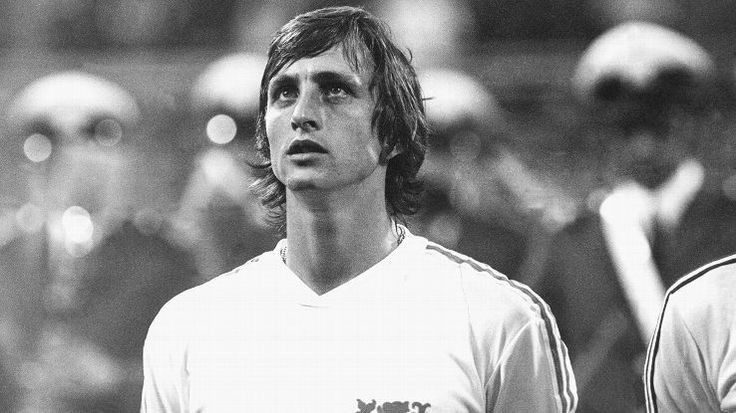
Career Highlights & Trophies:
- Ballon d’Or: 1971, 1973, 1974
- Eredivisie: 9 times
- European Cup (Champions League): 1971, 1972, 1973
- La Liga (Coach): 1990–91, 1991–92, 1992–93, 1993–94
Lifestyle: Visionary and innovator. Laid foundations for Ajax and Barcelona academies. Founded the Johan Cruyff Foundation.
Johan Cruyff’s Childhood
In the streets of Amsterdam, Netherlands, on April 25, 1947, a boy was born who would not only play football—but reinvent it. His name: Hendrik Johannes Cruijff, known to the world as Johan Cruyff — the visionary, the thinker, the artist of total football.
Cruyff grew up in Betondorp, a working-class neighborhood near the stadium of AFC Ajax. His father, Manus, was a grocer and a passionate football fan. His mother, Petronella, worked cleaning at the Ajax stadium after his father died from a heart attack when Johan was just 12 years old.
That loss shook his world, but football became his escape, his language, his purpose. The streets were his first classroom. With no grass and no coaches, Johan learned to think fast, move smart, and use every part of his body and brain. He wasn’t the biggest or strongest — but he was the cleverest.
Cruyff spent hours juggling, practicing dribbles, and developing an almost mystical understanding of space and movement. Ajax players and staff began to notice the skinny boy who always seemed to be nearby, soaking up every moment.
By 10, he was already in the Ajax youth system. By 17, he made his debut for the senior team. He wasn’t just playing football — he was thinking it, reshaping it, making it beautiful.
As a child, he questioned everything — even coaches. He wanted to know why things worked, not just how. That same questioning mind later transformed football philosophy around the world.
He would go on to lead Ajax and Barcelona, both as a player and a coach, influencing generations with a style known as “Total Football” — fluid, intelligent, beautiful.
But it all started with a boy on the pavement — grieving his father, guided by his mother, learning life through a ball on the streets of Amsterdam.
Johan Cruyff’s childhood was not just the beginning of a great career — it was the spark that lit a revolution. He taught us that football is not just about feet, but about freedom, thought, and vision.
9. Franz Beckenbauer (Germany)
Full Name: Franz Anton Beckenbauer
Born: September 11, 1945
Died: January 7, 2024
Position: Defender/Sweeper
National Team: West Germany
Clubs: Bayern Munich, New York Cosmos
Family: Married twice, father of multiple children
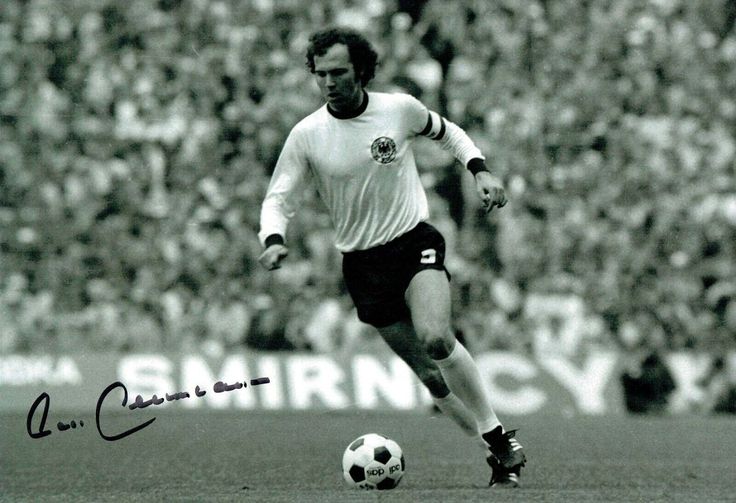
Career Highlights & Trophies:
- FIFA World Cup (Player): 1974
- FIFA World Cup (Manager): 1990
- European Championship: 1972
- Bundesliga: 4 times
- European Cup: 1974, 1975, 1976
Lifestyle: Elegant leader, later a football administrator. Organized 2006 FIFA World Cup in Germany.
Franz Beckenbauer’s Story
In the bustling district of Giesing, Munich, on September 11, 1945, a boy was born who would come to dominate the world of football with his elegance and leadership. His name: Franz Anton Beckenbauer — a boy destined to be known as Der Kaiser — the Emperor of Football.
Beckenbauer grew up in the aftermath of World War II, in a Germany still rebuilding itself from devastation. His family, like many others, faced poverty, but the love of football was a constant. His father, a postman, was passionate about the sport, and the streets of Munich became Franz’s playground. From the very start, his talent shone through.
At a young age, Franz would play on the small pitches of Giesing, often barefoot, kicking a ball with the carefree joy that only a child can. His style of play was different from others — he wasn’t just focused on the basics of passing and shooting; there was a calmness and vision to his game that set him apart. He had the rare ability to read the game, to be in the right place at the right time, and to lead without speaking loudly.
At 14, Franz joined the youth academy of Bayern Munich, where his skills began to develop rapidly. He was a natural, and his growth was more than just physical. He quickly became known for his elegance on the ball, his ability to organize play from the back, and his unshakable confidence.
By the age of 18, he made his first-team debut for Bayern Munich, and by 20, he was already a key player. Franz didn’t just play football; he revolutionized it, transforming the role of the sweeper — a player who controlled the game from the back, not just defending but also creating attacking opportunities.
In the years that followed, Beckenbauer would go on to lead both Bayern Munich and the West German national team to victory in the 1974 FIFA World Cup. His leadership, elegance, and intelligence on the field earned him the nickname “Der Kaiser” — a title fitting for a player who would redefine the concept of a football leader.
But beyond the fame and titles, Franz Beckenbauer’s roots were grounded in the streets of Munich, where a young boy with a ball and a dream learned to play with his head held high, creating a legacy that would shape the game for generations to come.
10. Neymar Jr. (Brazil)
Full Name: Neymar da Silva Santos Júnior
Born: February 5, 1992
Position: Forward
National Team: Brazil
Clubs: Santos, Barcelona, PSG, Al Hilal
Family: Has one son, close with father (former agent)
Career Highlights & Trophies:
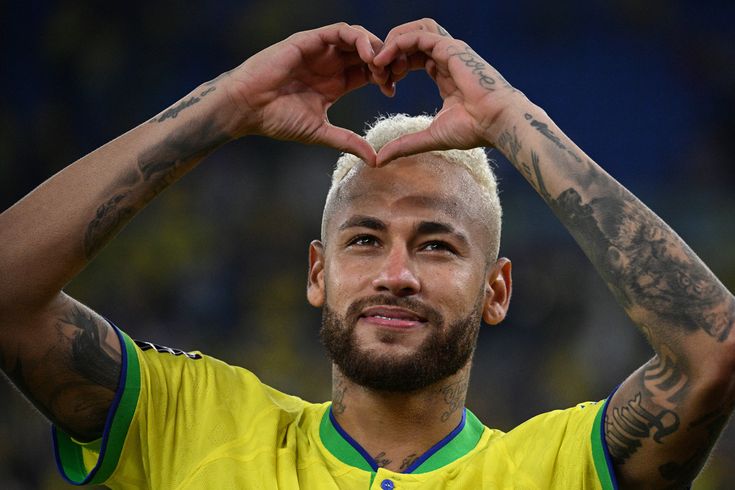
- Olympic Gold Medal: 2016
- Copa Libertadores: 2011
- La Liga: 2014–15, 2015–16
- Champions League: 2014–15
- French Ligue 1: 5 titles (2018–2023)
- Copa del Rey: 3 times
Neymar Jr.’s Story
In the sun-soaked streets of Mogi das Cruzes, a small town near São Paulo, on February 5, 1992, a boy was born who would one day become the face of Brazilian football. His name: Neymar da Silva Santos Júnior, known to the world simply as Neymar Jr..
Growing up in a working-class family, Neymar’s early years were filled with the rhythms of the Brazilian streets — the beats of samba, the joy of football, and the hum of ambition. His father, Neymar Sr., had been a professional footballer, and though he was not wealthy, he nurtured his son’s talent from a young age. Neymar’s mother, Nadine, was his pillar of love and encouragement.
As a child, Neymar wasn’t like other boys. He didn’t just play football; he danced with it. Whether it was on the sandy streets of his neighborhood or on the small futsal courts, Neymar’s feet had a language of their own. His dribbling was mesmerizing, his creativity boundless, and his joy was infectious. His natural talent was apparent from the start — but it wasn’t just skill that set him apart. Neymar had something deeper: a love for the game.
At 11 years old, Neymar joined the youth academy of Santos FC, one of Brazil’s most prestigious clubs. Despite his humble beginnings, his rise was unstoppable. He lived with his family in a small house near the stadium, and every day after school, he would go to the academy, perfecting his skills.
By 14, Neymar was already showing signs of greatness. His speed, vision, and agility made him stand out among his peers. It wasn’t long before Santos FC handed him his first professional contract, and at just 17 years old, Neymar debuted for the senior team. His dazzling skills quickly earned him the attention of Brazil’s top football clubs and international scouts.
At 18, Neymar became a sensation, leading Santos FC to victory in the 2011 Copa Libertadores. It was clear that Neymar wasn’t just a star — he was the future of Brazilian football. And by 2013, at just 21, Neymar made his move to FC Barcelona, where his partnership with Lionel Messi and Luis Suárez would redefine football for years to come.
Neymar’s story is one of determination, resilience, and love for the game. He went from the streets of Mogi das Cruzes to the grandest stadiums in the world, dazzling fans with his flair and charisma. But behind the smiles, the flair, and the fame, he never forgot where it all started — in the streets of Brazil, where a boy’s dreams took flight with every dribble, every pass, every goal.
Final Thoughts
These football legends have not only earned titles and awards but also transformed the game. Their influence stretches beyond stadiums—to media, business, and social causes. They are timeless role models who continue to shape the world of football and inspire generations worldwide.